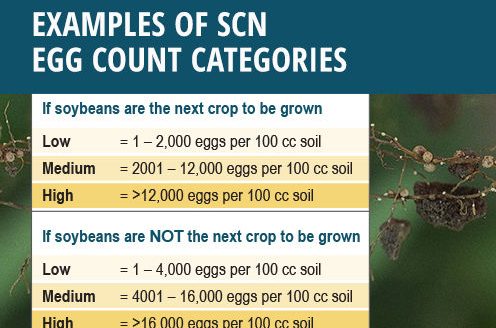SCN Coalition launches new mission
After a 20-year hiatus, the SCN Coalition is back encouraging soybean farmers to “Take the test. Beat the pest.” Like its predecessor, the new SCN Coalition is a public/checkoff/private partnership formed to help the agricultural industry speak with one voice about soybean cyst nematode management.
The difference: SCN is adapting and reproducing on SCN-resistant soybean varieties—and yields are decreasing. Managing SCN is becoming more complicated than planting a resistant variety and assuming the problem is solved.
“Twenty years ago, most soybean growers had never tested their fields for SCN,” said Greg Tylka, Ph.D., nematologist at Iowa State University and veteran of the first SCN Coalition. “So we encouraged growers to test, and if they had it, to plant a variety that’s resistant to SCN.”
PI 88788 is losing effectiveness
That simple solution from 20 years ago is a challenge for soybean producers today, as greater than 95 percent of all SCN-resistant soybean varieties contain the same source of resistance from the PI 88788 breeding line. Tylka likens this scenario to the growing problem with herbicide resistant weeds. “We tell farmers, ‘can you imagine what would happen if you used a single herbicide for 20 years?’” he said. “They all smile and get it. SCN is becoming resistant to the resistance.”
And that is hurting soybean yields. Data from 25 years of Iowa State University variety trial experiments shows that as SCN reproduction increases on PI 88788, yields of resistant soybean varieties decrease by as much as 14 bushels per acre. “Farmers are clearly losing yield, even growing the best SCN resistant varieties, because resistance is building,” Tylka said.
What is happening in Iowa is most likely occurring in other states, he added.
The SCN Coalition encourages farmers to test fields for SCN, to learn what the populations are doing.
“You’ll need those numbers to understand the severity of the problem,” Tylka added. “The higher your numbers, the greater your chances of yield loss and the higher that yield loss will likely be.
“It’s important for farmers to understand that they’re never going to get rid of soybean cyst nematode once they find it’s in their fields. But it’s not a death sentence. It’s similar to finding out you have high blood pressure—you learn to manage it as a chronic health problem,” he says.
SCN Coalition management recommendations
Because each grower’s SCN numbers, situation and available management options will be unique, the SCN Coalition recommends that soybean farmers work with their advisors and develop a plan to actively manage SCN:
• Test your fields to know your numbers;
• Rotate resistant varieties;
• Rotate to non-host crops; and
• Consider a seed treatment nematicide.
By turning up the volume on SCN resistance management, the Coalition’s goal is to increase soybean farmers’ profit potential and realize higher yields. The Coalition relaunched after 20 years, thanks to funding from the North Central Soybean Research Program, the United Soybean Board and in-kind support from Coalition partners.
Partners currently include university scientists from 27 states and Ontario; NCSRP, USB and several state soybean promotion boards; and a host of corporate partners.
Bill Spiegel can be reached at 785-587-7796 or [email protected].


